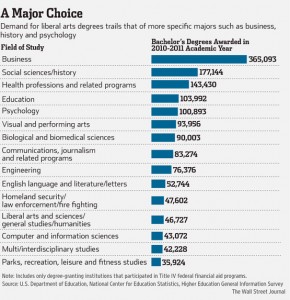 Insightful commentary from Peter Cappelli in the Wall Street Journal on the danger of over-specializing in college. Being a business or engineering major is one thing, but narrower specializations like hospital financing, casino management (ethics aside), and pharmaceutical marketing, can backfire. For students in all majors, broad, general learning skills (like critical thinking, problem solving, and writing) are of tremendous importance. More on this in chapter 10 of Preparing Your Teens for College.
Insightful commentary from Peter Cappelli in the Wall Street Journal on the danger of over-specializing in college. Being a business or engineering major is one thing, but narrower specializations like hospital financing, casino management (ethics aside), and pharmaceutical marketing, can backfire. For students in all majors, broad, general learning skills (like critical thinking, problem solving, and writing) are of tremendous importance. More on this in chapter 10 of Preparing Your Teens for College.
Capelli writes:
Focusing on a very specific field also means that you miss out on courses that might broaden your abilities. Courses that teach, say, hospitality management or sports medicine may crowd out a logic class that can help students learn to improve their reasoning or an English class that sharpens their writing. Both of those skills can help in any field, unlike the narrowly focused ones.
Beyond those concerns, a narrow educational focus forces students to pick a career at age 17, before they know much of anything about their interests and abilities. And if they choose incorrectly, it can be very difficult for them to start over once they’re older.
That’s true. But part of the answer is to help 17 year olds know more about their interests and abilities. The better incoming college students know who they are, and what the career paths that interest them entail (as well as what skills they require), the more likely they’ll be to pick something they can succeed in, leading to higher on-time graduation rates (and tens of thousands of dollars in savings). More on that in chapters 8-9 of Preparing Your Teens for College.
And a small word of caution on the popularity of psychology majors from economist Alex Tabarrok: “In 2009…we graduated 94,271 students with psychology degrees at a time when there were just 98,330 jobs in clinical, counseling and school psychology in the entire nation. The latter figure isn’t new jobs — it’s total jobs!” Counseling psychology is one of the lowest paying professions. Not that it should be avoided just for that reason, but incoming college students should “know before they go.”